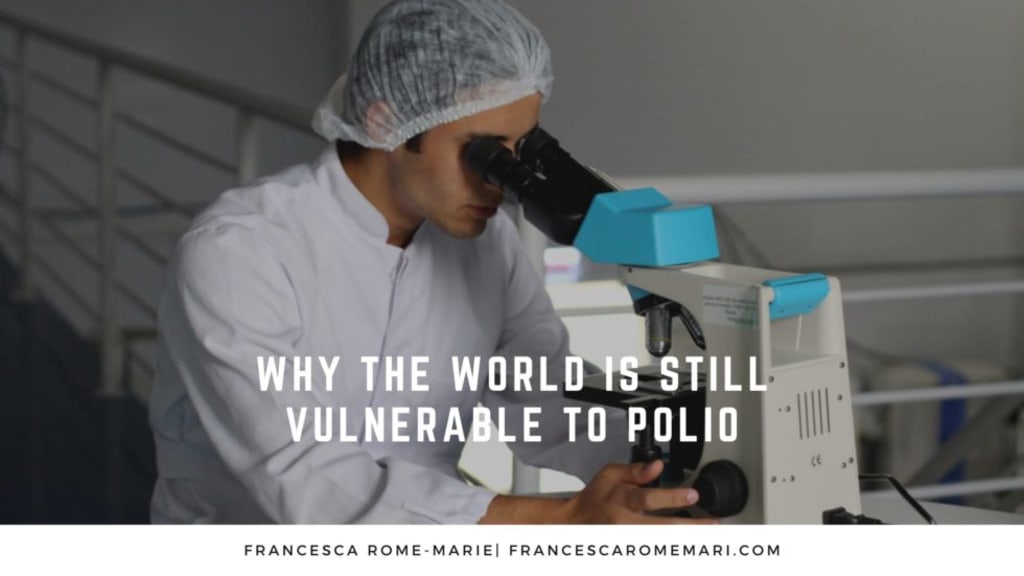Why the World Is Still Vulnerable to Polio
Francesca Rome-Marie | FrancescaRomeMarie.com

In the 1940s, polio was at its peak, causing illness in various parts of the world. The virus was known for living in the intestines and throat for up to six weeks. It would then make its way to the spinal cord, where it would cause muscle weakness and paralysis. Luckily, with medical innovation, polio types one and three have been certified as globally eradicated. But type one still circulates the world.
According to recent reports, over a hundred countries are still at risk of polio due to their failure to reach the immunization targets. The World Health Organization stated that over a hundred countries have been unable to reach 95 percent coverage for one-year-old children.
Health officials in the UK warned that the country might be experiencing a resurgence of the disease due to the presence of strains in its sewage. These samples, which had mutations that indicate the evolution of the virus, were sent to the laboratory. The samples were found in a sewage treatment facility in Beckton, located in east and north London.
Although it’s not clear how the virus has spread, health experts are worried that doctors might no longer recognize the symptoms of polio due to the country’s successful elimination of the disease.
Having more than 9 out of 10 people vaccinated is considered the most critical step that authorities can take to prevent the spread of the virus.
Vaccination is also vital for children as they are more likely to get sick and develop a severe illness after they catch the virus. Although most people will not experience any symptoms, a person infected with polio can develop a serious illness and even cause paralysis.
Among the countries that are considered vulnerable due to the low immunization rate are the US and the UK. In parts of Africa, fewer than four out of every ten people are vaccinated. The lack of reliable data regarding the immunization rate of children in various countries, including France, Germany, and Portugal, could mean even lower numbers. Parents are urged to ensure that their kids’ vaccinations are up to date.
Despite the various steps implemented to eliminate polio globally, experts believe it will remain a threat until it is completely eradicated.
The WHO noted that countries with low immunization rates risk getting the disease due to the lack of herd immunity. The virus can quickly spread to other people if the population has not been vaccinated. Even though samples were only discovered in London, health officials are urging the public to remain vigilant and take necessary measures to prevent the disease from spreading.
ABOUT FRANCESCA ROME-MARIE
Based in Rome, Italy, Francesca Rome-Marie is a compassionate and dedicated healthcare professional who has spent her life building a career in the service of others. She works in areas focused on health, humanitarian aid, and human development particularly focused on the nonprofit/not-for-profit sectors doing work in underserved and marginalized communities.
Throughout her career, Francesca Rome-Marie’s work and experience have helped her to develop skills in multiple areas. Her experience includes family medicine, nursing, family nursing, primary care, community health, mental health, global health, medicine, research, reproductive health, preventative medicine, and family nursing. She is also skilled in areas that include human rights activism, crisis counselling, sexuality education, gender theory, gender studies, cross-cultural communication skills, humanitarian assistance and intervention, interpersonal communication, nonprofit organizations, and disaster response, recovery, and preparedness. Francesca Rome-Marie has developed a particular passion for work in areas regarding sexuality and gender as well as refugees, forced displacement, health, and rights.
As part of her work in mental health and gender studies, Francesca Rome-Marie understands just how deeply a role that respect for individual dignity and sovereignty plays when it comes to making decisions about one’s own body and life. She has developed a commitment to viewing an individual’s mental and physical health through the lens of not only gender, sexual, and reproductive rights but also gender-based violence.
About the Creator
Francesca Rome-Marie
A dually board certified psychiatric and family nurse practitioner with a Masters in Disaster Management, Francesca Rome-Marie's professional focus lies at the intersection of health and identity. Learn more at francescaromemarie.org!






Comments
There are no comments for this story
Be the first to respond and start the conversation.